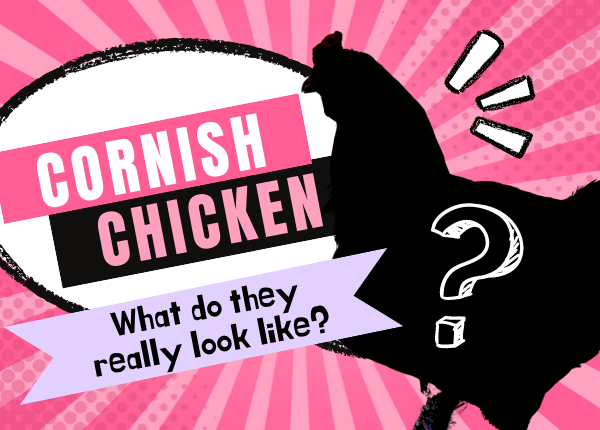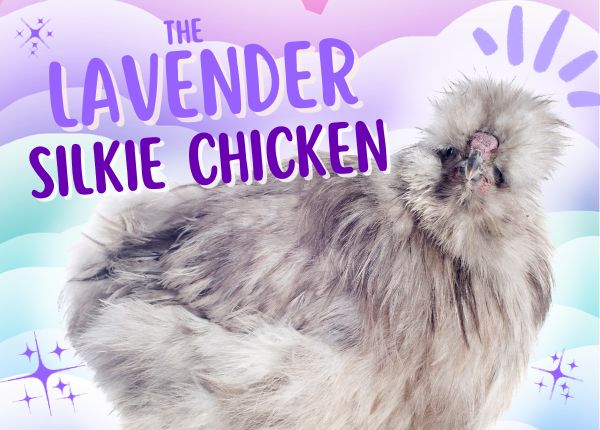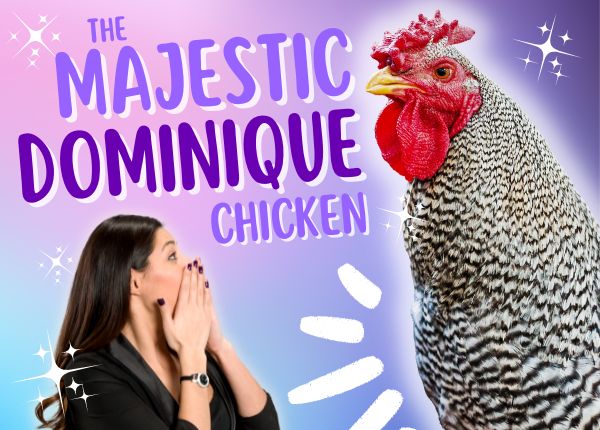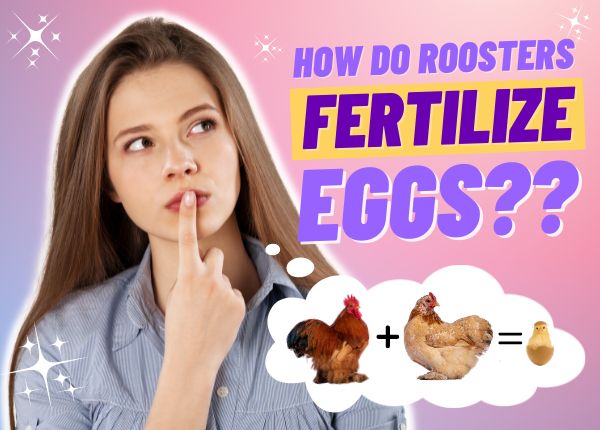
When researching anything 'Cornish' in the chicken world it's very easy to end up pecking around the wrong yard! You're not the first and you won't be the last confused by this tricky terminology.
So, before we go any further, Cornish Hen is not a breed of chicken, it's a meal🍗.
You'll be learning all about the real Cornish chicken here: the big, feathery, flappy thing with wings.
This is a female Cornish Chicken (sometimes understandably called a Cornish Hen)

This is Cornish Hen

Just to pickle your brain a bit more…before I unpickle it…which I promise I will:
A Cornish hen is just a female Cornish chicken…right? Wrong.
An Indian Game Chicken is a game chicken from India…right? Wrong
A game hen is a female…right? Wrong again!
Before I introduce you to the lovely Cornish chicken, I'm going to untangle this terminology madness for you by answering all your Cornish Hen questions:
Is Cornish Hen the same as a Cornish Chicken?
What is A Cornish Chicken?
What is Indian Game Chicken?
Why is it called the Indian Game Chicken?
What's a Cornish-Cross Chicken?
What is Cornish Hen?
Is Cornish Hen a young Cornish Chicken?
What is 'Traditional Cornish Hen'?
What is 'True Cornish Hen'?
Once you're feeling cocky that you know what a Cornish chicken actually is, then I'll help you decide if they've earned a place in your heart, and your coop!
Are Cornish Chickens Friendly?
How Big are Cornish Chickens?
Can You Get Cornish Chicken Bantams?
What do Cornish Chickens Look Like?
What are The Different Variations of Cornish Chickens?
How Many Eggs Does a Cornish Chicken Hen Lay?
What Are Cornish Chicken Eggs like?
Are Cornish Chicken Hens Broody?
Did Cornish Chickens come from Cornwall?
Are Cornish Chickens Suitable for Beginners?
Can I Keep Cornish Chickens Free-Range?
Are Cornish Chickens Cold Hardy?
Can Cornish Chickens Tolerate Heat?
Are Cornish Chickens Noisy?
Do Cornish Chickens Have Health Issues?
How Long Do Cornish Chickens Live For?
Are Cornish Chickens Hard to Care For?
Should I Get Cornish Chickens?
Seriously…What IS a Cornish Hen?
Is Cornish Hen the Same as a Cornish Chicken?
No. A Cornish chicken is a large chicken that's great for meat purposes. You can of course get Cornish Chicken hens and roosters, but the confusing term 'Cornish Hen' basically refers to a dish, and not a breed of chicken.
A Cornish Hen is a young Cornish or Cornish-Cross chicken that has been slaughtered young to be served whole as a lean, tender delicacy.

What is A Cornish Chicken?
A Cornish chicken is a standard-sized heritage chicken bred in Cornwall, England. It's a larger, meaty bird that looks slimmer than it is due to its chic choice of iridescent, slimming feathers. They aren't the best layers, but the females can make lovely pets.

What is Indian Game Chicken?
Indian Game Chicken is the original name for the Cornish chicken breed. They're the same bird. But don’t leave now, there is more to this story!
Whilst they’re mainly known as the Cornish chicken now, some countries still use the original name. It's been through various maiden names, so you may also see the Cornish chicken called the Cornish Indian Game, Cornish Game, or just Indian Game.
Why are Cornish Chickens Called Indian Game Chicken?
Cornish Chickens were originally called Indian Game Chickens, but they're not from India, and they're not game chickens! The chicken world baffles me.
The Indian Game chicken was bred in Cornwall, England to be a dual-purpose breed: not as in meat and eggs as we usually think of dual-purpose, but for meat and fighting. Unfortunately, it never had the urge to fight and wasn't particularly great at winning scraps. Breeding was re-focussed on meat purposes, but the name 'game' name still hangs around.
What's a Cornish-Cross Chicken?
The Cornish-Cross chicken is a hybrid of the Cornish chicken (for size) and the Plymouth White chicken (for speed of growth).

Whilst the Cornish chicken itself was a cross, a Cornish-Cross chicken is another breed altogether. Cornish chickens were great for meat but slow to grow and yellow in skin tone, so they were crossed with the fast-growing, white-skinned Plymouth White to hatch the perfect commercial meat bird.
What is Cornish Hen?
Cornish hen is a dish, not a breed of chicken. It's slaughtered at 4-6 weeks old, weighing no more than 32 ounces, when its breast has grown quickly enough to serve as a tender, lean, whole chicken. Cornish hen is healthier and lower in calories than standard chicken.
It's the same concept as European poussin, or 'spring chicken', which is a 3 or 4-week-old chicken of no particular breed that weighs 16-24 ounces, again served whole and tender.
In the UK, Cornish Hen could be a hen or a roo, it just has to be a young Cornish chicken.
In the US Cornish hen doesn't technically have to be Cornish, or a hen! The only requirement is that it is a young chicken. No wonder we're all so confused!
"As lamb is to mutton…and veal is to beef…Cornish hen is to chicken. Harvested when it is plump enough to satiate an empty stomach but tender enough to please the palate." (Edible Manhatten)
Is Cornish Hen a young Cornish Chicken?
No, not usually! Cornish Hen, or Rock Cornish Game Hen, is the term given to a young Cornish-cross chicken once it's been slaughtered. Until the point of slaughter, it's just a young Cornish cross.
The reason Cornish Hen (the dish) is usually from Cornish cross chickens is that they grow faster than the heritage Cornish chicken breed and have that popular white skin.
What is Traditional Cornish Hen?
'Traditional Cornish Hen' is a female Cornish Chicken, of any age. You'll usually only see this boasted about if it's a young female Cornish Chicken though, as that's what sells! Finally…it's what it says on the tin (or label)!
What is True Cornish Hen?
'True Cornish Hen' is a young Cornish Chicken hen – not a young Cornish-Cross, and not a rooster. It will be yellower in skin tone, not white.
Let's Crack those Cornish Chicken Terms

Let's 'Meat' the chicken behind the Sunday Roast
Are Cornish Chickens Friendly?
Cornish chickens are calm and docile and happy to be handled.😍 They can make lovely pets if they're handled regularly, but they're not all that sociable with their fellow fowl. The fighter in them insists they maintain their place at the top of the pecking order, and they won't shy away from a scrap over food.
Roosters were bred to fight, yeah, but weren't quite 'angry bird' enough to maintain their position as a game bird! They are relaxed unless forced to scrap over food or space. They've still got that fighter streak in them.
How Big are Cornish Chickens?
Cornish Chicken hens weigh 6-9.5 lbs, and Cornish chicken roosters weigh 8 - 10.5 lbs. They're very meaty, sturdy birds and hens can often outweigh their hubbies. Cornish chicken hens are 18 - 20 inches tall, and roosters might reach 22 inches.

 Can You Get Cornish Chicken Bantams?
Can You Get Cornish Chicken Bantams?
Yep! These pint-sized poultry don't work for producing Cornish hen meat, as they're so diddy. Bantam Cornish chicken roosters weigh 60 oz and Bantam Cornish chicken hens weigh 36 oz.
What do Cornish Chickens Look Like?
Cornish chickens may be beefy birds, but they know how to dress! Their close-knit feathers make them look a lot slimmer than they are. They have well-spaced legs, quite a wide, stocky build, and a short neck.
What are The Different Variations of Cornish Chickens?
In the US 12 varieties of Cornish chicken are recognized by either the APA or the ABA (that’s the bantam association):
- Black
- Blue
- Blue-Laced Red
- Buff
- Columbian
- Dark
- Jubilee
- Mottled
- Silver Laced
- Spangled
- White
- White-Laced Red
How Many Eggs Does a Cornish Chicken Hen Lay?
Cornish Chicken hens lay 160 - 180 eggs🥚 a year if you're clucky. They're not the best layers out there, but as a meat bird, they pull their (heavy) weight.
We asked over 160 poultry-mad pals how many eggs their backyard Cornish chicken hens laid and 90% said they could count on 3-4 a week. 10% said it was more likely to be 5 a week! Maybe they're better at this egg stuff than they've been given credit for?


What Are Cornish Chicken's Eggs like?
Cornish chicken's eggs are small to medium, pale brown eggs. They're tasty, but they're not winning any prizes here if you are a keen baker and enjoy a really large frequent bounty of fresh eggs.
Are Cornish Chicken Hens Broody?
Cornish Chicken mamas do get broody, and despite the challenges of having less fluffy feathers, they nurture their clutch the best they can. Sadly, they don't tend to hatch as many eggs as other breeds as their body shape and close-knit feathers don't make for the coziest nursery.
Did Cornish Chickens come from Cornwall?
In 1820 an English gent called Sir Walter Raleigh Gilbert played cupid to the powerful Red Aseel hen he had brought back from India, and the English, Black-breasted red game known for its speed. He was hoping for the ultimate fighting warrior and Sunday dinner combo, but the resulting cross wasn't very successful in the ring.
The new cross was, however, a very decent meat bird, and was recognized in the US in 1898 as the Indian Game Chicken. Only the Cornish (green/brown) and white variety were initially recognized.
In 1905 the word 'Cornish' was added to the beginning of Indian Game Chicken, for clarity, and then in 1910, the poultry powers made the fair comment that Cornish Indian Game Chickens were not Indian or Game, so the name was not going to stick. This is when they became known as Cornish Chickens.
In 1909 the white-lace red variety was recognized, and in 1938 the buff variety was acknowledged. Bantams have since been accepted.
Are Cornish Chickens Suitable for Beginners?
Cornish chickens can make for lovely pets, especially if you're keen to do your best for heritage breeds, but they aren't the easiest beginner's bird out there. They need a little more space, cleaning, and community care when housing with other breeds. If you're happy to have a Cornish-only flock though, a few hens and one rooster will be happy together and manageable. They are still fab, don’t get me wrong, but there are just other breeds out there that lend themselves to be sensational beginner breeds is all I am saying. You pros out there, go for it!
Can I Keep Cornish Chickens Free Range?
Yes! Cornish chickens do well free ranging, and whilst they're slow to grow they'll taste lovely with all that extra sunlight, exercise, and protein. They love to forage! They can be kept in a decent-sized run, but they get grouchy if they don't have enough space to stretch their feathers.
Are Cornish Chickens Cold Hardy?
Cornish Chickens don't do cold! Their sleek, flat feathers provide a very slimming, but rather useless winter jacket. They don't offer anything in terms of insulation. Whilst Cornish chickens will survive slightly colder conditions, they'll need all their energy to stay warm, they won't lay down fat and they won't lay eggs either, so it's all a bit pointless from a production point of view. English strains are a bit more cold hardy than American strains, but either way, this chicken wouldn't book a skiing holiday.
Can Cornish Chickens Tolerate Heat?
Cornish Chickens are a bit tricky to please, as they don't tolerate extreme temperatures at all. They're happiest in a temperate environment and are likely to need some extra care and shade in hotter climates.
Are Cornish Chickens Noisy?
Cornish chickens aren't particularly noisy. You'll know they're there, like any other breed, but they don't give too much backchat.
Do Cornish Chickens Have Health Issues?
Cornish chickens can suffer from obesity and related foot and leg issues, like lots of heavier meat breeds, but as long as they have lots of room to roam, they should avoid this. Other than this, and a slight predisposition for parasites, they've no breed-specific issue to watch out for. As I tell all my readers, prevention is key. Learn how to do a Hen Health Check on your girls from our buddies over at Chickenpedia! You will thank me later! I promise!
How Long Do Cornish Chickens Live For?
Cornish Chickens live for 5 – 8 years, and they may live longer if they're cared for well. You can learn more about what affects the lifespan of a chicken here (you’d be surprised what can be prevented with knowledge!).

Are Cornish Chickens Hard to Care For?
Cornish chickens are relatively easy to care for, and they're very easy to love! They aren't fussy feeders and will grow quicker than laying birds without slapping excessive feed bills on your counter.
They can injure themselves if they don't have the right hotel facilities, so make sure they have low roost bars so they don't have to jump too far to dismount and also that they won't need to squeeze through pop-hole doors that are not suitable for curvy gals. Check out Chickenpedia to find out what kind of coop will help your Cornish companions feel at home.
The hens are easy to handle, but they don't mix well with other bossy birds, so they'll need coop-troops who are happy for them to be the boss.
They seem to be mucky chuckies, with owners claiming they need to clean up behind their Cornish chickens more than other breeds.
Should I Get Cornish Chickens?
Cornish chickens are right for you if you're interested in a heritage meat bird who will enjoy life as a pet. The hens are friendly enough, but they're not the most affectionate of the larger breeds.

I asked Cornish chicken owners how many would keep the breed again, and the results were certainly split. Cornish chickens aren't everybody's cup of tea.
However, they're a lovely, sweet, worthy breed who would be grateful for a chance in your garden. Just because they're not the best at anything, there is nothing they don't offer! I don't like to call anyone an 'all-rounder', but this breed kinda is!

I'm glad you've finally sussed out your True Cornish hen from your commercial Cornish hen, and I hope you love this lovely breed as much as I do!
Cornish chicken owners, like any chicken owners, have never-ending questions about how to care for their Cornish chickens of loveliness. How big should their nest box be? Is it normal for her to stop laying in the winter? What is that in her poop?!
Chickenpedia has pecked out the perfect courses to answer all your clucky questions. From selecting the right breed for you to choosing the right coop and managing parasites…they have almost all the answers. I say almost because nobody can't tell us why we love the messy little madams sooo much. Yet, we do.











Leave a comment (all fields required)